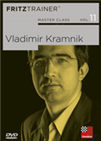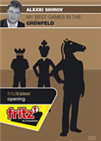An all-around talent
A man with a multifaceted personality, Peter Svidler is known for his excellent communicative abilities in English (and in Russian, of course), his tendency for self-deprecating humour and his obsessive love of cricket, just to mention a few of his most salient attributes. As a professional chess player — a career he seems to sustain without that much effort — he won the World Cup in 2011 and participated in three Candidates Tournaments, not to mention the fact that he has been a fixture among the elite for the best part of the last 25 years (he entered the Top 10 for the first time in 1998).
His list of accomplishments is much longer, but perhaps the most noticeable item among his distinctions is the fact that he has won the Russian Championship a whopping eight times — do not forget that we are talking about the country with the strongest chess tradition in the world.
Svidler won the national title for the first time in 1994, when he was just 18 years old. Back then, the championship was an 11-round Swiss open, and the young player from Saint Petersburg obtained a clear first place by scoring 8 points to finish ahead of second-placed Mikhail Ulibin. The lineup in that edition included the likes of Sergei Tiviakov, Evgeny Sveshnikov and Andrei Sokolov, all higher rated than Svidler.
 This DVD allows you to learn from the example of one of the best players in the history of chess and from the explanations of the authors (Pelletier, Marin, Müller and Reeh) how to successfully organise your games strategically, consequently how to keep y
This DVD allows you to learn from the example of one of the best players in the history of chess and from the explanations of the authors (Pelletier, Marin, Müller and Reeh) how to successfully organise your games strategically, consequently how to keep yThe Superfinal started being played as a round-robin in 2004, with Svidler winning half of his national titles in this format. Just to illustrate how strong these events can be, let us list the rating averages of the four tournaments Svidler won since 2004:
- 2008 - Rating average: 2673 - 12 players
- 2011 - Rating average: 2715 - 8 players
- 2013 - Rating average: 2696 - 10 players
- 2017 - Rating average: 2690 - 12 players
Talking about his secret to success as a player, Svidler told Yannick Pelletier in the midst of a — very enjoyable — two-and-a-half-hour conversation:
At some point, I actually invested some time in thinking about this, and I realized if there is something that you can say about me as a chess player in general terms is that I’m an extremely strong practical player. I think this describes me the best.
Will the witty man from Saint Petersburg manage to get his ninth title in the 73rd edition of the Russian Superfinals? We will find out by December 17.

A young Peter Svidler | Photo: ChessDiagonals
Svidler’s first victory at the Russian Championship gave him a great boost of confidence. Things could have gone very differently though, had Vasily Yemelin converted the superior position he got out of the opening:
“It’s move 10 and I’m completely lost here”, noted Svidler. His 10...e5 gave him enough counterchances to avoid losing immediately and a draw was signed after 26 moves. Svidler and Yemelin — who became a mathematician — are still close friends.
In the same Russian Championship, he beat the very strong Andrei Sokolov in the final round. Svidler considers this to be one of the most important games from his career. Sokolov could have continued playing from the following position, but resigned immediately instead:
 The Gruenfeld Defense is an active and dynamic reply to 1.d4 which can lead to complex and extremely sharp positions. So it’s no wonder that also Alexei Shirov included this opening into his repertoire. At the candidates’ final against Vladimir Kramnik in Cazorla in 1998, he exclusively – and successfully – trusted the Gruenfeld Indian with Black; the victory over Kramnik gave him the right to play a WCh match versus Kasparov.
The Gruenfeld Defense is an active and dynamic reply to 1.d4 which can lead to complex and extremely sharp positions. So it’s no wonder that also Alexei Shirov included this opening into his repertoire. At the candidates’ final against Vladimir Kramnik in Cazorla in 1998, he exclusively – and successfully – trusted the Gruenfeld Indian with Black; the victory over Kramnik gave him the right to play a WCh match versus Kasparov.
Svidler was walking around the playing hall and noted that a win would give him outright first place. Once he came back to his board, he was surprised by Sokolov’s resignation and said:
I was so shocked and also so relieved that I don’t have to convert this into a full point that I shook his hand and said, ‘Thank you’. It’s really not something that people do. I think it’s very kind of awkward and stupid (laughs).
All Peter Svidler’s games - 1994 Russian Championship
Links
























